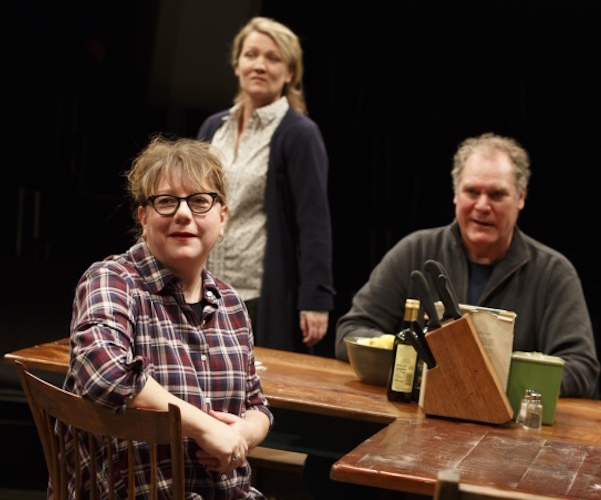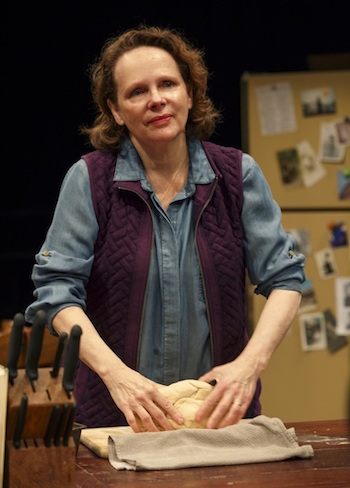Fuse Stage Review: Richard Nelson’s “Hungry” — The Terrible Beauty of Theater
Richard Nelson’s family members talk to each other, not to us. We are privileged to be permitted to listen in.
Election Year in the Life of One Family, Play One: Hungry, written and directed by Richard Nelson. At the Public Theater, New York, New York through April 3.

Amy Warren, Lynn Hawley, and Jay O. Sanders in Richard Nelson’s “Hungry” at New York’s Public Theater. Photo: Joan Marcus
By Joann Green Breuer
It’s a long climb up to the LuEsther stage at New York’s Public Theatre, but the destination is theatre heaven. Dramatist Richard Nelson brings us intimately close to another family in Rhinebeck, NY: the Gabriels. His Apple family gathered around their dining table over a period of four recent past years. The Gabriels meet during nine months as this American presidential election is evolving: Hungry happens on the Friday after ‘super Tuesday,’ the following two plays of the series will open mid September, and election night. Throughout the trilogy, the result of the election is unknown, for the Gabriels and for the audience. What will emerge of the family relationships is also unknown. Welcome to the wonder.
Having visited with the Apple family, perhaps one is no longer stunned by the fiercely tender, seeming simple style, seeming lack of artifact, uncompromising ‘seeming’ realism of conversation and gesture, and by the patient attention the Gabriels require of us. Nelson knows what he wants, and, with this extraordinary cast, achieves it. Once again, a listening device is recommended, and available, to hear the dialogue if one is not seated in the first few rows. This family talks to each other, not to us. We are privileged to be permitted to listen in. Eavesdropping is transformed from misdemeanor to gift.
The Apple family was nourished by Chekhovian resonance. The Gabriels have no obvious Russian references. This is an all American repast, culled from farmers markets and off-price wine shelves of a small, sensible suburb. Hungry may seem like a documentary, but it is not raw footage. Hungry is structured. It is artful. The genius is that its artifact is invisible, its discipline inviolable.
It is Friday March 4, 2016, late afternoon of the day the ashes of Thomas, brother, husband, son, have been cast into the Hudson River. Tom died four months ago. Time has replaced tears with recollection. It is permissible to laugh, to enjoy a meal. Preparing the dinner around the table are George, his brother (Jay O. Sanders), Joyce, his sister (Amy Warren), Mary, his widow (Mary Ann Plunkett), and Hannah, (Lynn Hawley), George’s wife. Joining the scene are Karin (Meg Gibson), Thomas’s first wife, and finally Patricia (Roberta Maxwell), Thomas’s mother. One might rightfully include the vegetables as part of this ensemble. Their bright colors and gentle aromas as they are peeled, sliced, and chopped, reveal subtler inner hues, even as the family members reveal theirs. Every aspect of the meal tempts us in mouth watering, heart pulsing, expectation.
And, for the record, one will never boil spaghetti the same way again.
One warning: beware, dear critic, of lapsing into symbolic exposition. Metaphor be damned. Yes, each moment can be transmogrified into symbols, but it is imperative to keep the actual quotidian doings in sight. Let the symbolism hang within the room, spirit-like. It is there inevitably, effortlessly, but to search for it is to overlook the thousand stubborn little moments which make meaning of a life. Notwithstanding my own caveat, this critic gave into temptation: the oven timer. Every now and then this tiny, white, etched orb buzzes, noticed and ignored until absolutely necessary. Time turns. Mortality rules. The readiness is all, indeed.

Maryann Plunkett in “Hungry.” Photo: Joan Marcus.
Other sound drifts in from an unseen sitting room, Schumann piano phrases, played carefully, and unresolved, by Joyce, the single sister. She has been practicing, a secret everyone knows. Joyce is a theatre designer. She curls against the wooden table, and has learned how to tell a joke. She has probably been practicing that as well.
Her brother, George, makes the best he can of manly comfort in a room full of women, helpful sans condescension. Occasionally he stumbles on a word, nothing a sip of weak wine, a weak smile, and a gentle hug won’t cover up.
Hannah is the outsider. Long divorced from Thomas, she is dressed too well, silk-ish blouse against the flannel shirts around her. Lonely, slyly she imagines; she longs for a family, a valid job. She, awkwardly obvious, hints to stay past the time she says she must leave, does, and does her darnedest to acclimate to the habitual rhythms of the Gabriels.
Hannah, George’s wife, has adapted well to the family meters. She senses when to listen, and even how to chide.
Patricia, Tom’s mother, makes (to me) a surprising entrance near the beginning of the meal, the close of the play. She is feminine and irascible, delicately dependent. We know why Joyce is afraid to touch her, even as we trust that someone will.
Mary, in whose kitchen the Gabriels assemble, is embraced by Mary Ann Plunkett. Has she changed since I saw her charged performances many years ago way, way down east, at Portland Stage in Portland, Maine, then at an audition where she offered an improbably brilliant, if, in this instance, considered inappropriate, soliloquy of Hamlet, and, of course, daunting, haunted, in the Apple family tetralogy. She may be more womanly, if such a generalization is possible, and, although by now one should come to expect it, undeniably, continually, arresting. Hers is a veiled luminosity, all the more exquisite as it glows with potential fire.
Richard Nelson, Honorary Associate of the Royal Shakespeare Company, is a recipient of both Olivier and Tony awards. Wherever he resides, there he creates a home. I have no idea if his own voice is found in Hungry, but I do suspect that with this composition he has heard the voices of those little lower than the angels.
A moment before the first scene opens, the actors enter and arrange chairs and items in the room. Brief blackout. Light. The characters emerge, and, as another great poet wrote: a terrible beauty is born.
Joann Green Breuer is artistic associate of the Vineyard Playhouse.
Tagged: Hungry, Maryann Plunkett, Richard Nelson, The Gabriels Family

A stunning review,Joann- as brilliant as the play.